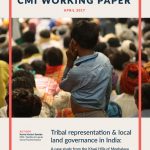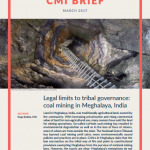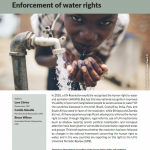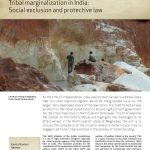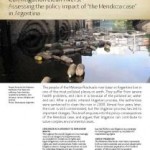Mathilde Thorsen (2018)
Bergens Tidende Debatt 19.07.2018
Mathilde Thorsen has written about water rights and the ongoing water crisis in India in Bergens Tidende. The text ask questions regarding who is in charge of securing people water, and call for global cooperation and respect of the human right to water. You can read the full text in Norwegian below or on Bergens […]
Kavita Navlani Søreide (2018)
Economic & Political Weekly Vol. 53, Issue No. 29, 21 Jul, 2018
Kavita Navlani Søreide has a new publication regarding land rights in Meghalaya in the newest volume of Economic & Political weekly. Mismanagement of Land in Meghalaya The recent clashes in Shillong between the indigenous Khasis and the minority Dalit Sikh community, cannot be dismissed as merely communal identity politics at play. The roots of the […]
Kavita Navlani Søreide (2017)
IAPS Dialogue: The online magazine of the Institute of Asia & Pacific studies: University of Nottingham
Lawtransform’s Kavita Navlani Søreide wrote an article in IAPS Dialogue about the challenges of environmental governance in Delhi. In November this year, Delhi earned the unenviable position of having the most polluted air on earth.This put the city’s 19 million plus population at a direct health hazard, bringing massive national and international attention to the issue. […]
Ángela María Páez-Murcia, Everaldo Lamprea-Montealegre and Catalina Vallejo-Piedrahíta (2017)
Vniversitas. Bogotá (Colombia), n° 134: 209-248, enero-junio de 2017
This paper presents the results of an empirical study that systematized environmental judicial opinions handed down by Colombia’s highest administrative Court —Consejo de Estado— over a 17-year period (1998-2015). Thanks to a research grant, the authors and a team of coders systematized, using state-of-the art content analysis methodologies, more than 250 opinions handed down by […]
Kavita Navlani Søreide (2017)
CMI Working Paper n. 4, 2017
A case study from the Khasi Hills of Meghalaya In India, the Schedule Tribes have remained on the fringes of growth, but less so in the majority tribal areas of the North East. This has increased the interest in the Sixth Schedule, the special constitutional provision relating to these areas, recognising the tribal communities’ rights […]
Namita Wahi, Ankit Bhatia, Pallav Shukla, Dhruva Gandhi, Shubham Jain, and Upasana Chauhan (2017)
Centre for Policy Research
The CPR Land Rights Initiative Report is the first comprehensive country wide study of land acquisition disputes before the Supreme Court since India’s independence. The Report analyses these disputes along various metrics, such as public purpose, procedure for acquisition, compensation, pendency of claims, and tracks trends with respect to distribution of disputes across geography and time, and central and state […]
Hugo Stokke (2017)
Bergen: Chr. Michelsen Institute (CMI Brief vol. 16 no. 2) 4 p.
Land in Meghalaya, India, was traditionally agricultural land, owned by the community. With increasing privatization and rising commercial value of land for non-agricultural use, many owners have sold the land for mining operations. So-called rat-hole coal mining has resulted in environmental degradation as well as in the loss of lives of miners, most of whom […]
Bruce Wilson, Camila Gianella, Lara Côrtes (2016)
Bergen: Chr. Michelsen Institute (CMI Brief vol. 15 no. 9) 4 p.
This brief explores whether the 2010 UN Resolution that explicitly recognized the human right to water and sanitation (HRtWS) has been followed by changes in the national framework, and in the way countries are reporting on this right to the UN’s Universal Periodic Review (UPR). Enforcement of water rights
Kavita Navlani Søreide (2013)
CMI Brief vol. 12 no. 4, 2nd edition
At the time of independence, India used protective law to address fears that its tribal majority regions would be marginalized vis-a-vis the larger, more developed states of the new nation. The ‘Sixth Schedule’ was written into the Indian Constitution to ensure rights of self-government for the tribal majorities in North Eastern Himalayas. This brief explores the context of the Sixth […]
Kristi Staveland-Sæter (2012)
Bergen: Chr. Michelsen Institute (CMI Brief vol. 11 no. 3) 4 p.
The people of the Matanza-Riachuelo river basin in Argentina live in one of the most polluted places on earth. They suffer from severe health problems, and claim it is because of the polluted air, water and soil. After a public interest litigation process, the authorities were sentenced to clean the river in 2008. Almost four […]
 Hvem har ansvaret for å sikre folk vann?
Hvem har ansvaret for å sikre folk vann?


